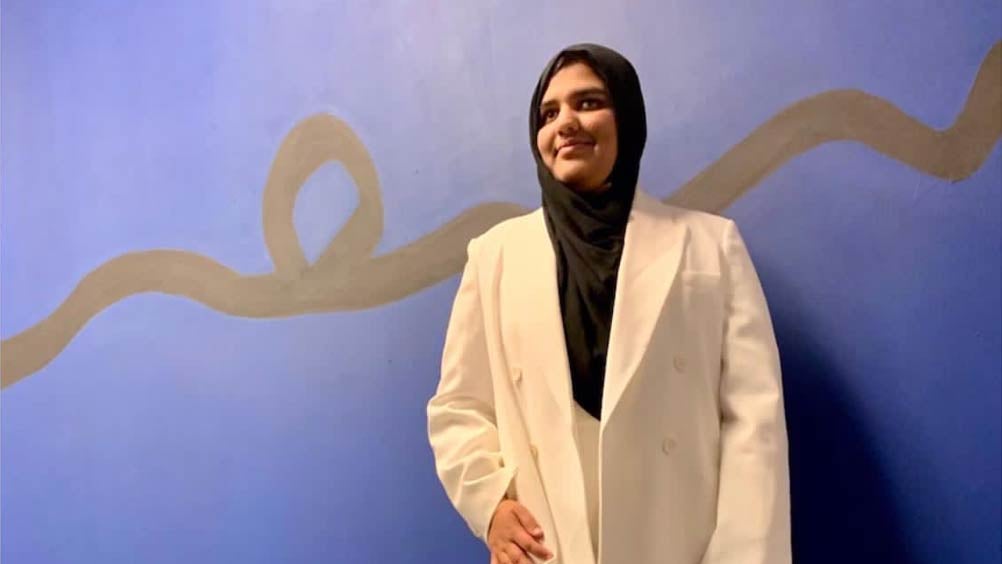Georgetown Disability Research and Rights Advocate at QF is Awarded Rhodes Scholarship to Study at Oxford

Khansa Maria, a student at QF partner Georgetown University in Qatar, has been named a winner of a Rhodes Scholarship to attend the University of Oxford in the United Kingdom, one of the most prestigious and selective postgraduate degree scholarships in the world.
After graduating at the end of the academic year in 2021, the GU-Q senior plans to use the generous grant to pursue a master’s degree in evidence-based social intervention and policy evaluation at Oxford, with the goal of becoming an effective policy maker for inclusive development in Pakistan.
Khansa has already performed significant research on disability rights through an Undergraduate Research Experience Program grant from the Qatar National Research Fund (UREP24-215-5-041) to study employment challenges facing people with disabilities in Qatar, and in her Honors in the Major thesis which examines the trajectory of the disability rights movement within South Asia through the lens of literature.
The Dean of GU-Q, Dr. Ahmad Dallal, said: “For an undergraduate applying to graduate school, there are few distinctions that can surpass a Rhodes Scholarship in prestige. We are immensely proud of our student Khansa for this outstanding achievement, and we look forward to following her academic journey beyond Georgetown as she builds on the important policy research that began right here at Qatar Foundation. Khansa personifies the values of a Georgetown education: critical thinking and responsible and ethical action.”
Born and raised in Lahore, Pakistan, Khansa has been blind since birth and has had to contend with social stigma and an educational system that lacked inclusive educational policies. Undaunted and with the support of her family, Khansa made it her mission to confront both the cultural and structural barriers that perpetuate harmful stereotypes that result in the social, economic, and political marginalization of people with disabilities.
An international affairs curriculum, small class size, and emphasis on student research led Khansa to Georgetown’s Qatar campus in Education City, where she majored in Culture and Politics, a degree which she says “gave me a critical lens to view disability policy creation and evaluation. I began to recognize the inextricable link between the culture that shapes us, and the policies that we hope will shape our future.”
And her advocacy work extends far beyond the classroom. From TedxYouth talks, to winning debate championships, to founding the Hope for Tomorrow organization, and serving in Student Government and other leadership roles, Khansa has been breaking down barriers, shedding light on disability issues, and fighting for inclusion and accessibility at every step of her journey.
Her Honors Thesis faculty mentor, Dr. Ian Almond, said: “Despite her young age, Khansa already has an enviable and seldom-seen grasp of many basic theoretical paradigms (post-feminism, deconstruction, trauma theory, new historicism, etc) and seems at home in discussing their many complexities. She has an incredible hunger for anything new – and it is heartening to see this in a student.”
Dr. Sonia Alonso, Khansa’s UREP project faculty mentor, shared similar praise, saying: “Khansa is a truly remarkable person. Candidates to the Rhodes Scholarship ‘are chosen not only for their outstanding scholarly achievements, but for their character, commitment to others and to the common good, and for their potential for leadership in whatever domains their careers may lead,’ reads the Rhodes Trust website. In my opinion, Khansa is the embodiment of all those qualities.”
Despite a stellar academic record and an impressive list of achievements, Khansa says it never occurred to her to apply for the Rhodes Scholarship, a career-defining achievement whose past recipients have included some of history’s most famed scientists, scholars, authors, global leaders, and entrepreneurs. “My friends and professors worked hard to convince me to apply, and they supported me every step of the way. I couldn’t have done this without their encouragement.”
Only one Rhodes Scholarship is awarded to a student from Pakistan each year, and Khansa plans on making the most of her achievement. After completing her studies, she plans on returning to Pakistan to continue her efforts towards ensuring equal educational opportunities and workforce legal protections for people with disabilities. “I call myself a disability rights activist, but I know that this is not enough,” she said. “It takes all of us working together to make the changes that we want to see. I hope this next step brings me closer to working towards making that change. My Georgetown journey taught me that fighting for my rights and against internalized structural ableism never gets easier and yet it is up to us to fight against all odds.”